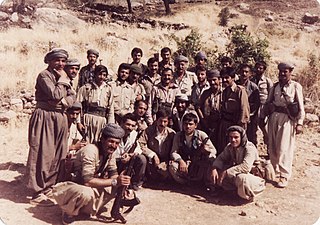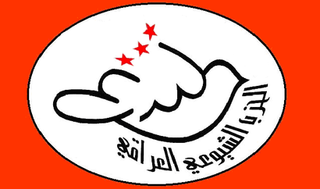
The Kurdistan Communist Party/Iraq is a Kurdish political party, formed in 1993 when the Iraqi Communist Party branch in the Kurdish areas was formed into a separate party. The party is led by Kamal Shakir.
Al-Wathbah uprising or simply Al-Wathbah, which means The Leap in Arabic, was the term that came to be used for the urban unrest in Baghdad in January 1948. The protests were sparked by the monarchy’s plans to renew the 1930 Anglo-Iraqi Treaty that effectively made Iraq a British protectorate. Nuri al-Said, the Prime Minister of Iraq, was planning on renewing, albeit in a revised form, this 1930 treaty that tied Iraq to British interests, allowed for the unrestricted movement of British troops on Iraqi soil, and provided significant protection to the British-installed Iraqi monarchy.

Al-Ansar was a guerrilla force attached to the Iraqi Communist Party, active between 1979 and 1988.
The Communist Action Organization in Iraq was a communist organization in Iraq. The organization was founded in, after a split from the Iraqi Communist Party. The founders of the Communist Action Organization saw the Communist Party leadership as a 'rightist and opportunist tendency', criticizing their past cooperation with the Baath Party. Moreover, the Communist Action Organization accused the Communist Party leaders for having deviated from Marxism-Leninism.
Fahd's Revolutionary Organization was a communist organization in Iraq. The organization was founded in the middle of 1985, after a split from the Iraqi Communist Party. The founders of the organization consisted of younger cadres of the Communist Party, who opposed the party leadership. The organization sought to build a new Marxist-Leninist party, recalling the legacy of the Communist Party stalwarth leader Yusuf Salman Yusuf ('Fahd'). The organization published al-Munadhil ash-Shiui. The founder and leader of the organization, the labour leader Hikmat Kutani, was forced into exile in Canada. He became a member of Worker-communist Party of Iraq. Kutani died in 1999 in exile.
Rayat ash-Shaghilah was a communist organization in Iraq, named after its publication with the same name. Rayat ash-Shaghilah was founded in 1953 by a group that had been expelled from the Iraqi Communist Party. Its main spokesperson was Jamal al-Haidari. Rayat ash-Shaghilah was the largest communist splinter-group in Iraq at the time.
Ila al-Amam was a communist group in Iraq, known by the publication it issued under that name. The group publishing Ila al-Amam had been expelled from the Iraqi Communist Party in August 1942, after which they founded Ila al-Amam. The main leaders of the group were Thunun Ayub ('Qadir') and Yaqub Cohen ('Fadil'). Inside the Communist Party, Ayub had been a Central Committee member but had developed personal differences with the Communist Party general secretary Fahd.
Shursh ('Revolution') was an Iraqi Kurdish communist organization. It emerged in 1945, out of the Kurdish section of the erstwhile Wahdat an-Nidal group. The Kurdish section, continuing as Shursh, had refused to merge into the Iraqi Communist Party.
Jamal al-Haidari was an Iraqi communist politician. He joined the Iraqi Communist Party in 1946, and became the leader of a rebel communist faction during the 1950s. After rejoining the Communist Party in 1956 he became a prominent leader but was entangled in the internal disputes of the party. In 1963 he was executed by the new Baathist regime.
The ar-Rashid revolt refers to a 1963 failed uprising against the Baathist government in Iraq. The revolt was plotted by followers of the Iraqi Communist Party in junction with military officers. The revolt failed to spread outside Baghdad and was crushed by the Baathist forces.

The Ramadan Revolution, also referred to as the 8 February Revolution and the February 1963 coup d'état in Iraq, was a military coup by the Ba'ath Party's Iraqi-wing which overthrew the Prime Minister of Iraq, Abd al-Karim Qasim in 1963. It took place between 8 and 10 February 1963. Qasim's former deputy, Abdul Salam Arif, who was not a Ba'athist, was given the largely ceremonial title of President, while prominent Ba'athist general Ahmed Hassan al-Bakr was named Prime Minister. The most powerful leader of the new government was the secretary general of the Iraqi Ba'ath Party, Ali Salih al-Sa'di, who controlled the National Guard militia and organized a massacre of hundreds—if not thousands—of suspected communists and other dissidents following the coup.
Al-Mabda' was a communist daily newspaper published from Baghdad, Iraq. Al-Mabda' was founded by the dissident communist politician Daud as-Sayegh. The first issue of al-Mabda' was published on 21 November 1959. The newspaper was allegedly supported by the government of Abd al-Karim Qasim. According to Neue Zürcher Zeitung, the Qassim government had issued a substantial loan to as-Sayegh for the sake of publishing al-Mabda'.
The Iraqi Communist Party of Daud as-Sayegh was a short-lived political party in Iraq, which existed parallel to the main Iraqi Communist Party. It emerged in 1960, after the enactment of the Associations Law. Daud as-Sayegh was the chairman of the party. The party published the daily newspaper al-Mabda'.
The Associations Law was a law in Iraq, which legally regulated political parties. The law was promulgated on 1 January 1960. Prior to the adoption of this law, political parties had been banned since 1954. The law came into force on 6 January 1960.
Ittihad ash-Sha'ab was a daily newspaper published from Baghdad, Iraq. Ittihad ash-Sha'ab was the main organ of the Iraqi Communist Party. Abd al-Qadir Isma'il al-Bustani was the editor-in-chief of Ittihad ash-Sha'ab.
Al-Qaidah was a newspaper published in Iraq. It was an organ of the Iraqi Communist Party. It was printed clandestinely for thirteen years, albeit with interruptions.




